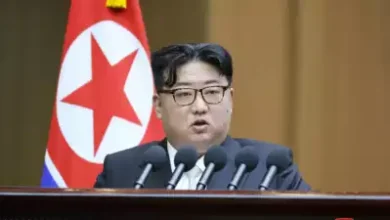EXPLAINED: What sanctions do the US impose on Iran? How can more be imposed by Washington?
Washington: In response to Iran’s unprecedented assault on Israel, the US has threatened to put more sanctions on the country. New sanctions on Tehran, which may be aimed at limiting the nation’s ability to export oil, are expected to be implemented within days, according to US Treasury Secretary Janet Yellen’s statement on Tuesday. Republicans in Congress are also debating a number of proposals related to Iran.

Here are specifics on current sanctions against Iran and potential US actions going forward:
To what extent is Iran now subject to US sanctions?
According to the Congressional Research Service (CRS), Washington’s sanctions on Iran already prohibit almost all US commerce with the nation, freeze the government’s assets here, and forbid US foreign aid and military sales.
According to a study released by the CRS last year, thousands of individuals and businesses—both domestic and foreign—have been singled out by the sanctions program as Washington tries to restrain Iran’s leadership and alter its actions.
Iran’s nuclear program, violations of human rights, and backing for organizations the US considers terrorist have all raised worries in the US.
“Iran is subject to what is arguably the most comprehensive and extensive set of sanctions that the United States imposes on any nation,” the CRS said.
How far can America go?
Former National Security Council officer Peter Harrell said that the US may target Iranian oil exports and play a more aggressive version of “Whac-A-Mole” to go after Iran’s front organizations and funders.
He stated that because the majority of the sanctions now in place on Iran are US-imposed, one of the most important steps would be for Washington to persuade the European Union and other western partners to impose multilateral penalties on Tehran.
When he withdrew in 2018, former President Donald Trump restored the US sanctions that had been loosened as part of an international agreement on Tehran’s nuclear program.
Harrell said, “We have to be realistic that, from a US perspective, we are in a world of diminishing actual economic pressure because we have so many sanctions already in place, even though there are always more sanctions you can impose.”
What is Congress thinking about?
Republican leaders in the House have accused President Joe Biden of not enforcing current sanctions and have announced that they will be introducing several proposals to tighten the sanctions against Iran.
Legislation that would tighten controls on US technology and goods exports to Iran, strengthen congressional oversight of sanctions waivers, and mandate that the administration guarantee that humanitarian sanctions exemptions do not encourage terrorism or the spread of WMDs is among them.
There is no word on when, or if, any of the bills would become law—they would need to clear the Senate, which is controlled by Democrats, and be signed by Democratic President Joe Biden.
The Iran-China Energy Sanctions Act, which would increase sanctions on Iran by mandating yearly reports to ascertain if Chinese financial institutions have engaged in transactions involving Iranian oil, was overwhelmingly approved by the House late on Monday. Any Chinese firms involved in such transactions would not be allowed to have accounts with US financial institutions.
The Senate’s position on the measure is unclear.
The Senate, which is controlled by Democrats, may take up its own bills. Following a comparable bill approved by the House last year, the Senate Foreign Relations Committee on Tuesday passed a bill that would impose restrictions on foreign ports and refineries that handle oil supplied from Iran in violation of US sanctions.
Since 2021, hundreds of individuals and organizations have been subject to sanctions by the Biden administration due to actions involving Iran.
Which aspects of the present measures are most important?
US sanctions on Iran have targeted the country’s nuclear program, banks, government personnel, the energy and military industries, and other facets of its economy:
The US has placed sanctions on dozens of institutions, including the Central Bank of Iran, as well as the Iranian Atomic Energy Organization and other businesses it claims are connected to Iran’s nuclear program.
In an attempt to cut off Iran’s revenue from the energy sector, Washington has also targeted the Ministry of Petroleum, the National Iranian Oil Company, and other organizations. In addition, Washington has targeted foreign businesses, such as those in China and the United Arab Emirates, for trading Iranian petroleum and petrochemicals in spite of US sanctions.
The Iranian Revolutionary Guard Corps (IRGC), its foreign Quds Force, the Ministry of Defense and Armed Forces Logistics, and individuals and organizations it said were connected to them have all been subject to several rounds of sanctions by the US. The Quds Force and the IRGC have been classified as foreign terrorist organizations by Washington.
President Ebrahim Raisi and other Iranian government figures have been singled out.







